外研版(2019) 选择性必修第一册 Unit 1 Laugh out Loud! Using language课件(29张ppt)
文档属性
| 名称 | 外研版(2019) 选择性必修第一册 Unit 1 Laugh out Loud! Using language课件(29张ppt) | 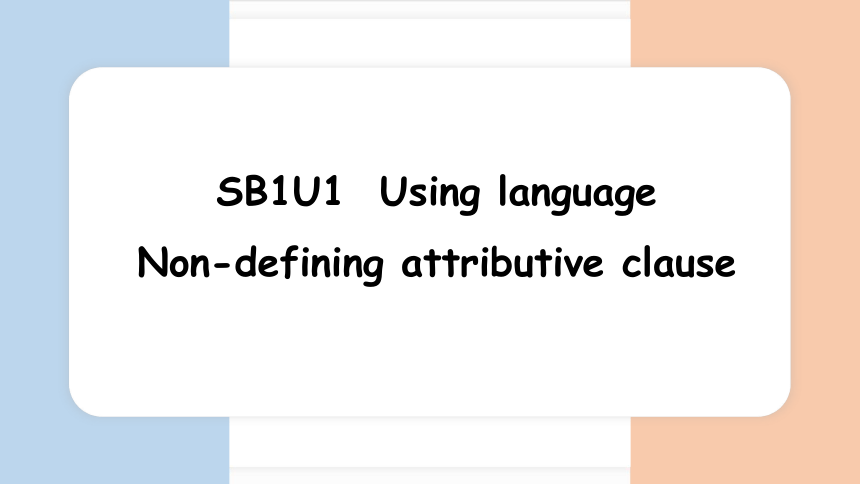 | |
| 格式 | pptx | ||
| 文件大小 | 7.3MB | ||
| 资源类型 | 教案 | ||
| 版本资源 | 外研版(2019) | ||
| 科目 | 英语 | ||
| 更新时间 | 2022-10-09 17:18:54 | ||
图片预览

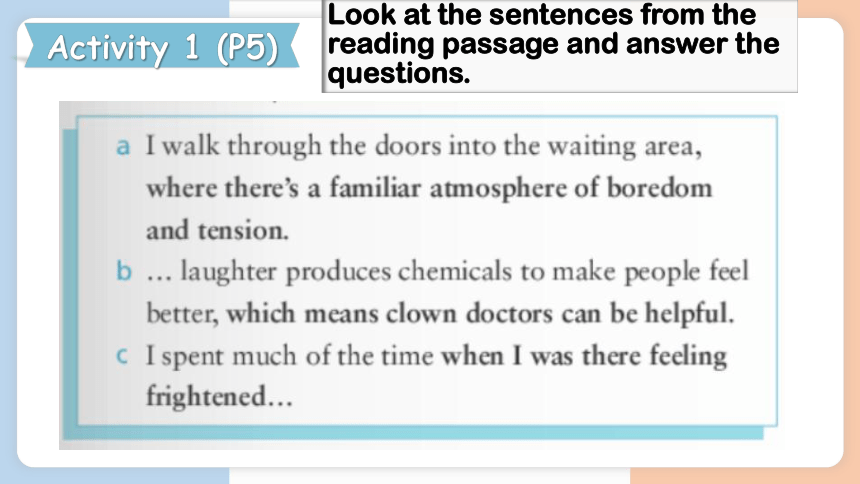
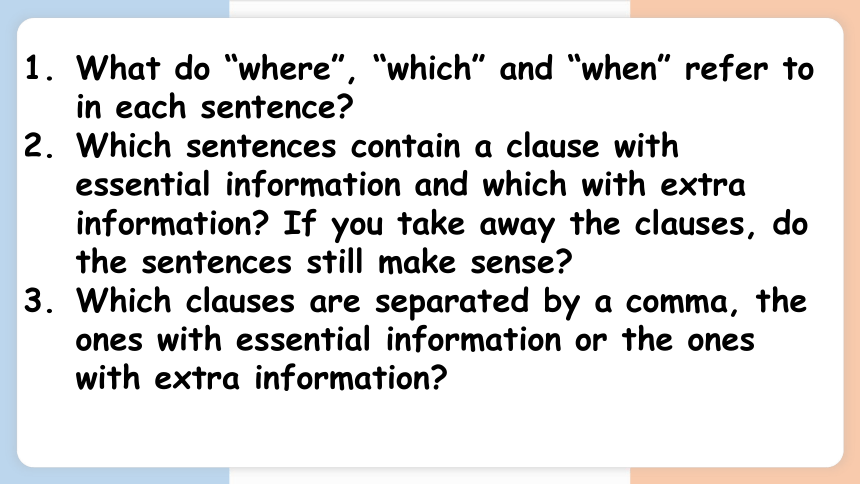
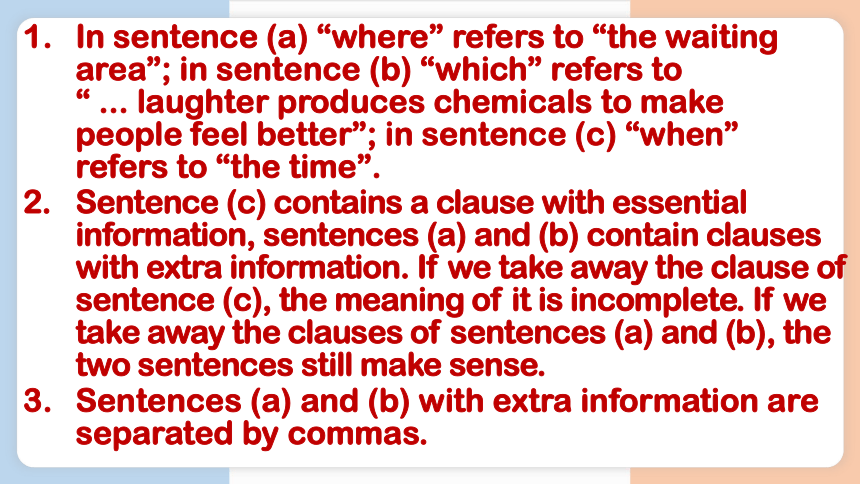
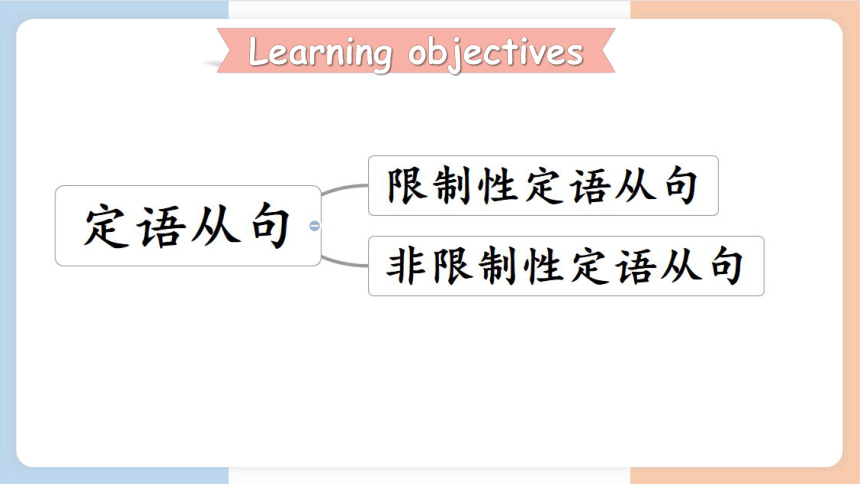
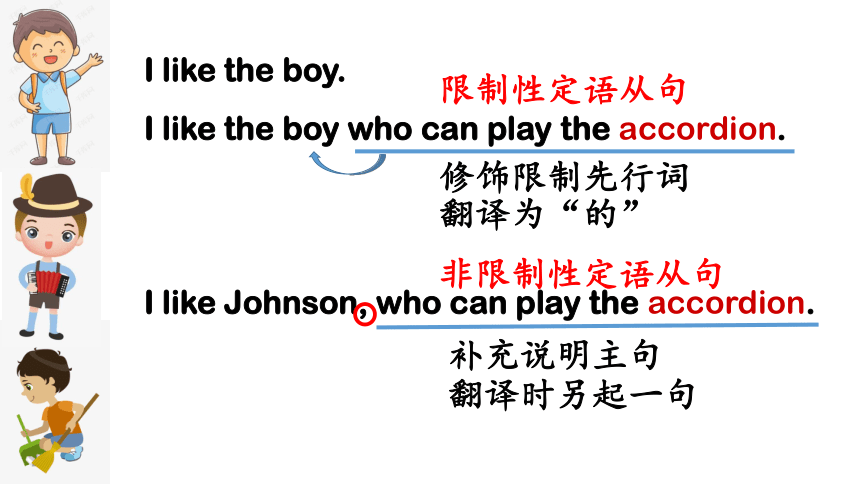
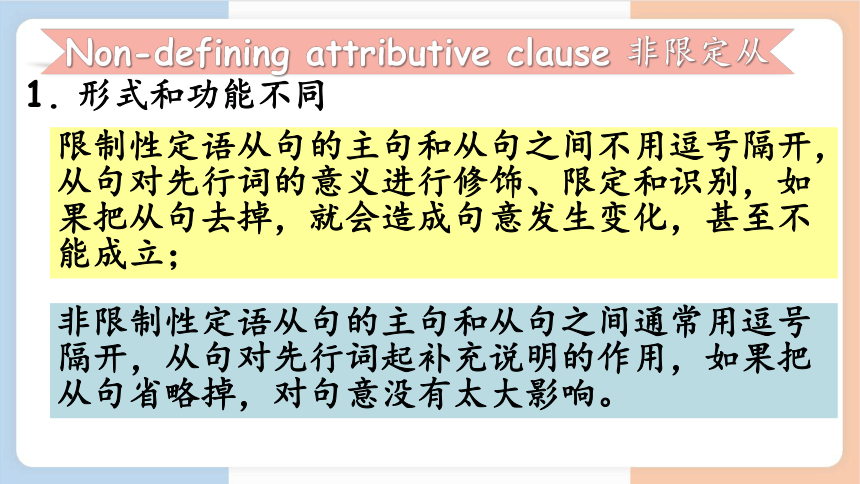
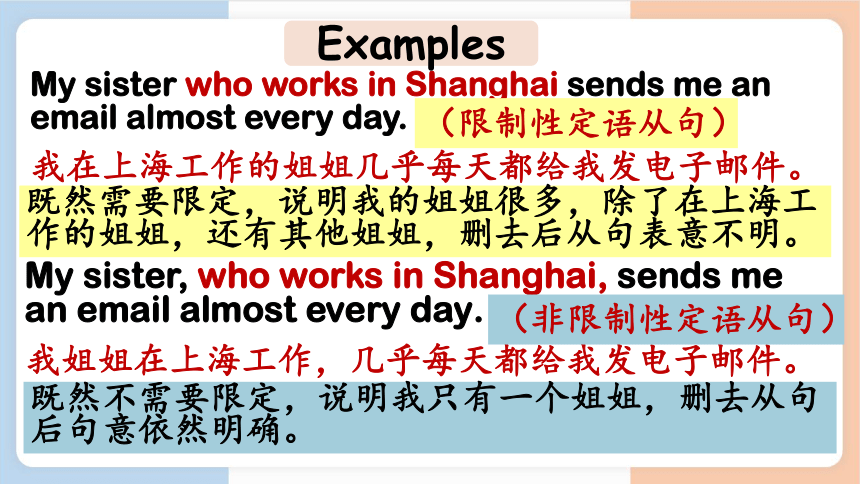
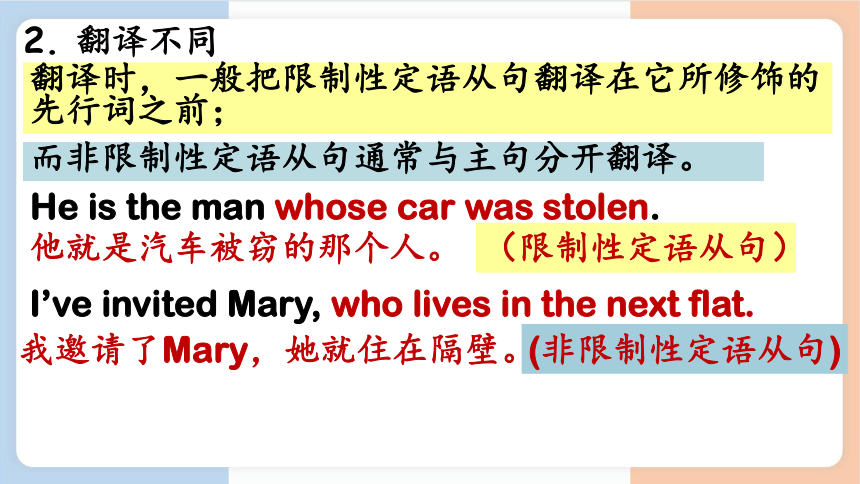
文档简介
(共29张PPT)
SB1U1 Using language
Non-defining attributive clause
Activity 1 (P5)
Look at the sentences from the reading passage and answer the questions.
What do “where”, “which” and “when” refer to in each sentence
Which sentences contain a clause with essential information and which with extra information If you take away the clauses, do the sentences still make sense
Which clauses are separated by a comma, the ones with essential information or the ones with extra information
In sentence (a) “where” refers to “the waiting area”; in sentence (b) “which” refers to “ ... laughter produces chemicals to make people feel better”; in sentence (c) “when” refers to “the time”.
Sentence (c) contains a clause with essential information, sentences (a) and (b) contain clauses with extra information. If we take away the clause of sentence (c), the meaning of it is incomplete. If we take away the clauses of sentences (a) and (b), the two sentences still make sense.
Sentences (a) and (b) with extra information are separated by commas.
Learning objectives
I like the boy.
I like the boy who can play the accordion.
I like Johnson, who can play the accordion.
限制性定语从句
修饰限制先行词
翻译为“的”
非限制性定语从句
补充说明主句
翻译时另起一句
Non-defining attributive clause 非限定从
1. 形式和功能不同
限制性定语从句的主句和从句之间不用逗号隔开,从句对先行词的意义进行修饰、限定和识别,如果把从句去掉,就会造成句意发生变化,甚至不能成立;
非限制性定语从句的主句和从句之间通常用逗号隔开,从句对先行词起补充说明的作用,如果把从句省略掉,对句意没有太大影响。
My sister who works in Shanghai sends me an email almost every day.
既然需要限定,说明我的姐姐很多,除了在上海工作的姐姐,还有其他姐姐,删去后从句表意不明。
我在上海工作的姐姐几乎每天都给我发电子邮件。
(限制性定语从句)
Examples
My sister, who works in Shanghai, sends me an email almost every day.
既然不需要限定,说明我只有一个姐姐,删去从句后句意依然明确。
我姐姐在上海工作,几乎每天都给我发电子邮件。
(非限制性定语从句)
2. 翻译不同
翻译时,一般把限制性定语从句翻译在它所修饰的先行词之前;
而非限制性定语从句通常与主句分开翻译。
He is the man whose car was stolen.
他就是汽车被窃的那个人。
(限制性定语从句)
I’ve invited Mary, who lives in the next flat.
我邀请了Mary,她就住在隔壁。
(非限制性定语从句)
3. 先行词不同
限制性定语从句的先行词常常是名词或代词;
非限制性定语从句的先行词可以是名词或代词,也可以是短语或整个句子。
Shanghai is no longer the city that it used to be.
上海不再是过去的那座城市了。
He who laughs last, laughs best.
谁笑到最后谁就笑得最好。
(限制性定语从句)
先行词是名词
先行词是代词
(限制性定语从句)
Charles Smith, who was my former teacher,
retired last year.
Charles Smith去年退休了,他曾经是我的老师。
(非限制性定语从句)
They rely on themselves, which is much better.
他们依靠自己,这样好得多。
(非限制性定语从句)
先行词是名词
先行词是句子
限制性定语从句和非限制性定语从句的区别
限制性 非限制性
形式上 不用逗号 用逗号
意义上 去掉后主句意思不完整 去掉后主句意思完整
作用 修饰限制 补充说明
先行词 词(n/pron)/短语 词/短语/整个主句
关系词 关代作宾时可省 whom作宾时可用who代 不用that, why引导
所有关代均不可省
翻译 先译从句再译先行词, ……的…… 先译先行词后译从句,形成两个分句
Relative Pronouns
referring to a human referring to something other than a human possessive
Restrictive who, whom, that which, that, as whose
Non-restrictive who, whom which, as whose
This is the man (whom/who/that) we are talking about.
The young man had a new girlfriend, whom he wanted to impress.
Her father, who has a lot of money, wishes her to study abroad.
(改错) I had to fix my printer, that I bought less than a year ago.
非限制性定语从句的使用
1. 修饰专有名词
I look forward to climbing the Great Wall, which is one of the great wonders in the world.
2. 先行词特指某一类事物/独一无二的人/事物
Football, which is a very interesting game, is played all over the world.
3. 修饰句子
On March 8, 2014, 154 Chinese died in the crash of Flight MH370, which was a frightening news for us.
Fill in the blanks. Add prepositions or commas if necessary.
Many years ago, there was a clergyman(神职人员) ________ name is John. He had to go from one place to another ________ he could meet his fellowmen. Therefore, he missed his mum very much, ________ lived alone in London.
John tried hard to help all his fellowmen, but he soon met with many difficulties, ________ the most serious was his clothing. As a clergyman, he had to be in black all day long, a colour ________ often frightened some of his fellowmen, especially children. He really hated it. Finally, John made up his mind and said, “I will wear no clothes ________ will distinguish me from my fellowmen.”
A few days later, a reporter heard of John’s words and put them on the newspaper, ________ brought John some unexpected trouble.
whose
where
who
of which
that/which
that
which
介词+关系词
In the dark street, there wasn’t a single person_________ she could turn for help.
to whom
The factory _________ his father works is faraway from my hometown.
in which
This is Mr. Smith, _________ factory we work.
in whose
We stood at the top of the hill, ___________ we can see the town.
from where
Activity 2 (P5)
Read the passage and rewrite the tips using non-defining attributive clauses. Add more tips to the list if you can.
Go for a walk in the countryside, where you can enjoy the beautiful views and a peaceful atmosphere.
Spend time with your family and friends, which will activate chemicals in your brain to make you feel happier.
Try to accept your mistakes, where / through which you can learn a lot.
Close your eyes and picture the future, where you’ve made your dreams come true.
Activity 3 (P5)
Complete the joke with the sentence parts in the box using who / which and put commas in the correct position.
who is lying next to him
which he finds annoying
which he thinks will impress Holmes
who has lost his patience by now
Activity 5 (P6)
Listen and complete the conversations.
Fun time
Why are you grinning from 1 ____________
Cool! What are you going to watch
Yes! I laughed my 2 ___________. You’ll enjoy it!
I’ve won a free cinema ticket.
My Crazy Family. Have you seen it
ear to ear
head off
I really don’t get Harry.
No. Today, he was all 3 _________.
He asked me to help him with that website of his.
Well, I said yes. We all deserve a second chance, I guess.
Why Is he still not talking to you
Really What did you say
smiles
What’s the matter Why the long face
That’s so funny!
Yesterday, I stepped on a banana skin and fell over in front of the whole class.
I was the 4 ____________ stock of the class. Even my teacher cracked
5 _____________!
laughing
a smile
Activity 6 (P6)
Match the expressions you have completed in the above activity to their meanings.
_______________: a person that everyone laughs at because they have done something funny or silly
_______________: to look friendly and happy, especially when other people are not expecting you to
________________: to look extremely happy because you are very pleased about something
________________: to smile slightly
________________: to laugh very loudly and for a long time
laughing stock
be all smiles
grin from ear to ear
crack a smile
laugh one’s head off
Activity 6 (P6)
Now work in groups and think of more expressions about laughter.
a good laugh
burst out laughing
fall about laughing
for laughs
have / get the last laugh
He who laughs last, laughs best.
哈哈大笑
放声大笑
忍不住大笑
为了取乐;作为消遣
笑到最后
笑到最后的人笑得最开心。
giggle; laugh foolishly; simper
grin
smile at sb
smile bitterly
smirk
snicker; laugh up one’s sleeve
tease; make fun of
朝某人微笑
苦笑
幸灾乐祸地笑
窃笑
取笑
傻笑
咧着嘴笑
Did You Know
April Fool’s Day is on 1 April. It’s the one day of the year when people in many parts of the world play practical jokes on each other. Even newspapers, radio and TV stations play tricks on their readers and audiences. The jokes traditionally last until noon in the UK. But in some other countries, such as the US, they can last all day!
Activity 8 (P7)
Listen to the radio programme and choose the pictures mentioned.
√
√
√
Activity 9 (P7)
Listen again and complete the notes.
“the washing of the lions”
18th and 19th centuries
smells to be carried
BBC News Channel
1965
a really good harvest
1957
Activity 10 (P7)
Complete the boxes with expressions from the radio programme.
Let’s start with ...
Now, my favourite one ...
That’s so funny!
It’s a good one!
I can imagine!
I don’t get it.
Thank you
SB1U1 Using language
Non-defining attributive clause
Activity 1 (P5)
Look at the sentences from the reading passage and answer the questions.
What do “where”, “which” and “when” refer to in each sentence
Which sentences contain a clause with essential information and which with extra information If you take away the clauses, do the sentences still make sense
Which clauses are separated by a comma, the ones with essential information or the ones with extra information
In sentence (a) “where” refers to “the waiting area”; in sentence (b) “which” refers to “ ... laughter produces chemicals to make people feel better”; in sentence (c) “when” refers to “the time”.
Sentence (c) contains a clause with essential information, sentences (a) and (b) contain clauses with extra information. If we take away the clause of sentence (c), the meaning of it is incomplete. If we take away the clauses of sentences (a) and (b), the two sentences still make sense.
Sentences (a) and (b) with extra information are separated by commas.
Learning objectives
I like the boy.
I like the boy who can play the accordion.
I like Johnson, who can play the accordion.
限制性定语从句
修饰限制先行词
翻译为“的”
非限制性定语从句
补充说明主句
翻译时另起一句
Non-defining attributive clause 非限定从
1. 形式和功能不同
限制性定语从句的主句和从句之间不用逗号隔开,从句对先行词的意义进行修饰、限定和识别,如果把从句去掉,就会造成句意发生变化,甚至不能成立;
非限制性定语从句的主句和从句之间通常用逗号隔开,从句对先行词起补充说明的作用,如果把从句省略掉,对句意没有太大影响。
My sister who works in Shanghai sends me an email almost every day.
既然需要限定,说明我的姐姐很多,除了在上海工作的姐姐,还有其他姐姐,删去后从句表意不明。
我在上海工作的姐姐几乎每天都给我发电子邮件。
(限制性定语从句)
Examples
My sister, who works in Shanghai, sends me an email almost every day.
既然不需要限定,说明我只有一个姐姐,删去从句后句意依然明确。
我姐姐在上海工作,几乎每天都给我发电子邮件。
(非限制性定语从句)
2. 翻译不同
翻译时,一般把限制性定语从句翻译在它所修饰的先行词之前;
而非限制性定语从句通常与主句分开翻译。
He is the man whose car was stolen.
他就是汽车被窃的那个人。
(限制性定语从句)
I’ve invited Mary, who lives in the next flat.
我邀请了Mary,她就住在隔壁。
(非限制性定语从句)
3. 先行词不同
限制性定语从句的先行词常常是名词或代词;
非限制性定语从句的先行词可以是名词或代词,也可以是短语或整个句子。
Shanghai is no longer the city that it used to be.
上海不再是过去的那座城市了。
He who laughs last, laughs best.
谁笑到最后谁就笑得最好。
(限制性定语从句)
先行词是名词
先行词是代词
(限制性定语从句)
Charles Smith, who was my former teacher,
retired last year.
Charles Smith去年退休了,他曾经是我的老师。
(非限制性定语从句)
They rely on themselves, which is much better.
他们依靠自己,这样好得多。
(非限制性定语从句)
先行词是名词
先行词是句子
限制性定语从句和非限制性定语从句的区别
限制性 非限制性
形式上 不用逗号 用逗号
意义上 去掉后主句意思不完整 去掉后主句意思完整
作用 修饰限制 补充说明
先行词 词(n/pron)/短语 词/短语/整个主句
关系词 关代作宾时可省 whom作宾时可用who代 不用that, why引导
所有关代均不可省
翻译 先译从句再译先行词, ……的…… 先译先行词后译从句,形成两个分句
Relative Pronouns
referring to a human referring to something other than a human possessive
Restrictive who, whom, that which, that, as whose
Non-restrictive who, whom which, as whose
This is the man (whom/who/that) we are talking about.
The young man had a new girlfriend, whom he wanted to impress.
Her father, who has a lot of money, wishes her to study abroad.
(改错) I had to fix my printer, that I bought less than a year ago.
非限制性定语从句的使用
1. 修饰专有名词
I look forward to climbing the Great Wall, which is one of the great wonders in the world.
2. 先行词特指某一类事物/独一无二的人/事物
Football, which is a very interesting game, is played all over the world.
3. 修饰句子
On March 8, 2014, 154 Chinese died in the crash of Flight MH370, which was a frightening news for us.
Fill in the blanks. Add prepositions or commas if necessary.
Many years ago, there was a clergyman(神职人员) ________ name is John. He had to go from one place to another ________ he could meet his fellowmen. Therefore, he missed his mum very much, ________ lived alone in London.
John tried hard to help all his fellowmen, but he soon met with many difficulties, ________ the most serious was his clothing. As a clergyman, he had to be in black all day long, a colour ________ often frightened some of his fellowmen, especially children. He really hated it. Finally, John made up his mind and said, “I will wear no clothes ________ will distinguish me from my fellowmen.”
A few days later, a reporter heard of John’s words and put them on the newspaper, ________ brought John some unexpected trouble.
whose
where
who
of which
that/which
that
which
介词+关系词
In the dark street, there wasn’t a single person_________ she could turn for help.
to whom
The factory _________ his father works is faraway from my hometown.
in which
This is Mr. Smith, _________ factory we work.
in whose
We stood at the top of the hill, ___________ we can see the town.
from where
Activity 2 (P5)
Read the passage and rewrite the tips using non-defining attributive clauses. Add more tips to the list if you can.
Go for a walk in the countryside, where you can enjoy the beautiful views and a peaceful atmosphere.
Spend time with your family and friends, which will activate chemicals in your brain to make you feel happier.
Try to accept your mistakes, where / through which you can learn a lot.
Close your eyes and picture the future, where you’ve made your dreams come true.
Activity 3 (P5)
Complete the joke with the sentence parts in the box using who / which and put commas in the correct position.
who is lying next to him
which he finds annoying
which he thinks will impress Holmes
who has lost his patience by now
Activity 5 (P6)
Listen and complete the conversations.
Fun time
Why are you grinning from 1 ____________
Cool! What are you going to watch
Yes! I laughed my 2 ___________. You’ll enjoy it!
I’ve won a free cinema ticket.
My Crazy Family. Have you seen it
ear to ear
head off
I really don’t get Harry.
No. Today, he was all 3 _________.
He asked me to help him with that website of his.
Well, I said yes. We all deserve a second chance, I guess.
Why Is he still not talking to you
Really What did you say
smiles
What’s the matter Why the long face
That’s so funny!
Yesterday, I stepped on a banana skin and fell over in front of the whole class.
I was the 4 ____________ stock of the class. Even my teacher cracked
5 _____________!
laughing
a smile
Activity 6 (P6)
Match the expressions you have completed in the above activity to their meanings.
_______________: a person that everyone laughs at because they have done something funny or silly
_______________: to look friendly and happy, especially when other people are not expecting you to
________________: to look extremely happy because you are very pleased about something
________________: to smile slightly
________________: to laugh very loudly and for a long time
laughing stock
be all smiles
grin from ear to ear
crack a smile
laugh one’s head off
Activity 6 (P6)
Now work in groups and think of more expressions about laughter.
a good laugh
burst out laughing
fall about laughing
for laughs
have / get the last laugh
He who laughs last, laughs best.
哈哈大笑
放声大笑
忍不住大笑
为了取乐;作为消遣
笑到最后
笑到最后的人笑得最开心。
giggle; laugh foolishly; simper
grin
smile at sb
smile bitterly
smirk
snicker; laugh up one’s sleeve
tease; make fun of
朝某人微笑
苦笑
幸灾乐祸地笑
窃笑
取笑
傻笑
咧着嘴笑
Did You Know
April Fool’s Day is on 1 April. It’s the one day of the year when people in many parts of the world play practical jokes on each other. Even newspapers, radio and TV stations play tricks on their readers and audiences. The jokes traditionally last until noon in the UK. But in some other countries, such as the US, they can last all day!
Activity 8 (P7)
Listen to the radio programme and choose the pictures mentioned.
√
√
√
Activity 9 (P7)
Listen again and complete the notes.
“the washing of the lions”
18th and 19th centuries
smells to be carried
BBC News Channel
1965
a really good harvest
1957
Activity 10 (P7)
Complete the boxes with expressions from the radio programme.
Let’s start with ...
Now, my favourite one ...
That’s so funny!
It’s a good one!
I can imagine!
I don’t get it.
Thank you
